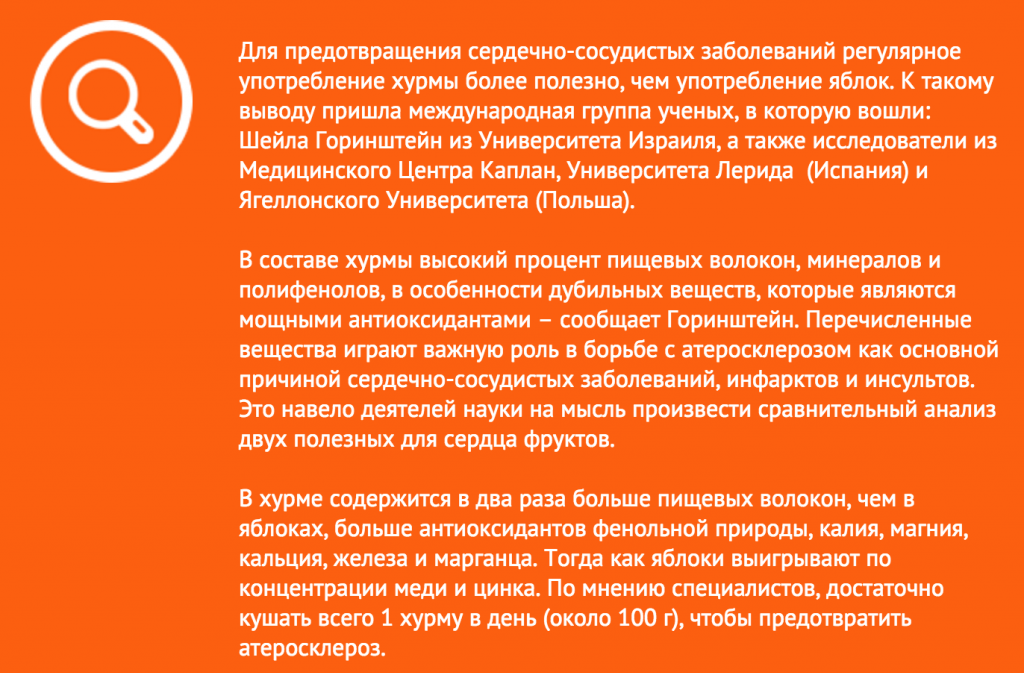Persimmon is on the list of the most wholesome foods. By its taste, nutritional and dietary properties, only citrus fruits are ahead of it. It contains substances that are very important for humans, which contribute to improving health and well-being.
But persimmon, in addition to the benefits in the form of a complex of vitamins and minerals necessary for the body, can also bring harm, since among the contraindications for use are intestinal diseases, diabetes and children under three years of age. It is also very important not to abuse the product, especially pregnant, lactating women and children of primary school age.
Content
- 1 The chemical composition and beneficial properties of persimmons
- 2 Contraindications to the use of persimmons and harm to the human body
- 3 The health benefits of persimmons for women
- 4 Features of the use of persimmons for men
- 5 Is it possible to eat persimmons with type 2 diabetes and how much?
- 6 Use for liver diseases
- 7 Rules for the use of persimmons and how much you can eat
- 8 Common questions
The chemical composition and beneficial properties of persimmons
Persimmon is a subtropical plant of the Ebony family. It is most common in Southwest Asia. It is also grown in many countries - in Armenia, Georgia, Spain, Greece and Turkey. Fruits have a round or slightly elongated shape and orange color. The taste of the berry is sweet and tart. Persimmon contains many useful substances that are necessary for the human body. Among them:
- beta carotene;
- monosaccharides;
- vitamin complex (B vitamins, vitamin C, A);
- tannins;
- micro and macro elements (iodine, iron, potassium and magnesium);
- organic acids;
- water (about 80%).
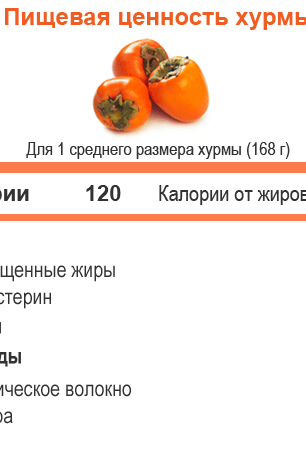
This composition determines the beneficial properties of persimmon:
- Low calorie content. In 100 g of the fetus, approximately 60 kcal. Such a low energy value allows people who monitor their weight to consume it.
- High nutritional value. The composition contains fats, proteins and carbohydrates, as well as monosaccharides, which contribute to the saturation of the body and for a long time create a feeling of satiety.
- Tonic effect. The product helps with physical exhaustion, improves performance.
- Antioxidant effect. Vitamin A and beta-carotene help protect the body from the negative effects of free radicals - and this is the prevention of aging and cancer.
- Vision improvement.
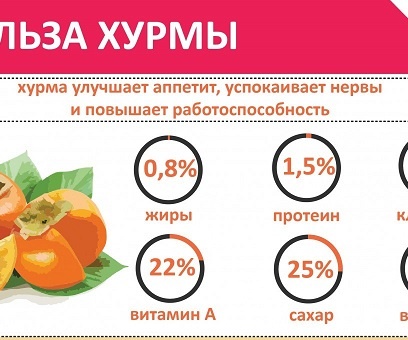
Beneficial features - Prevention of hypertension, a positive effect on the cardiovascular system.
- The ability to strengthen the immune system. Since the fruits have a large amount of vitamins (especially vitamin C), they increase immunity. This is especially necessary in the cold season, when the risk of colds and viral diseases increases.
- Improving kidney function (due to potassium content).
- Positive effect on the musculoskeletal system.
- Prevention of anemia. The fetus has a large amount of iron, this trace element is necessary for normal blood formation.
- Improving metabolism.
- A positive effect on the functioning of the brain and the functioning of the nervous system.
- Tannins have a fastening effect, which is very important for diarrhea.
- Due to the iodine content, the thyroid gland improves. Also, this substance has disinfectant and antiseptic properties.
- Diuretic action.Persimmon helps to remove sodium salts from the body. At the same time, a lack of potassium is not felt, since it makes up for its loss.
Breeders bred a lot of varieties of persimmons. In total, more than 500 of its species are known in the world. One of the most popular in the domestic market is Korolek and Bull Heart.
Korolek
A very popular variety of persimmons is Korolek. It is also called Black Apple and Chocolate Pudding. This is due to the fact that when fully ripened, the variety acquires a dark color and becomes very sweet. Most fruits are the size of an average apple. But sometimes they can reach a weight of 1 kg.
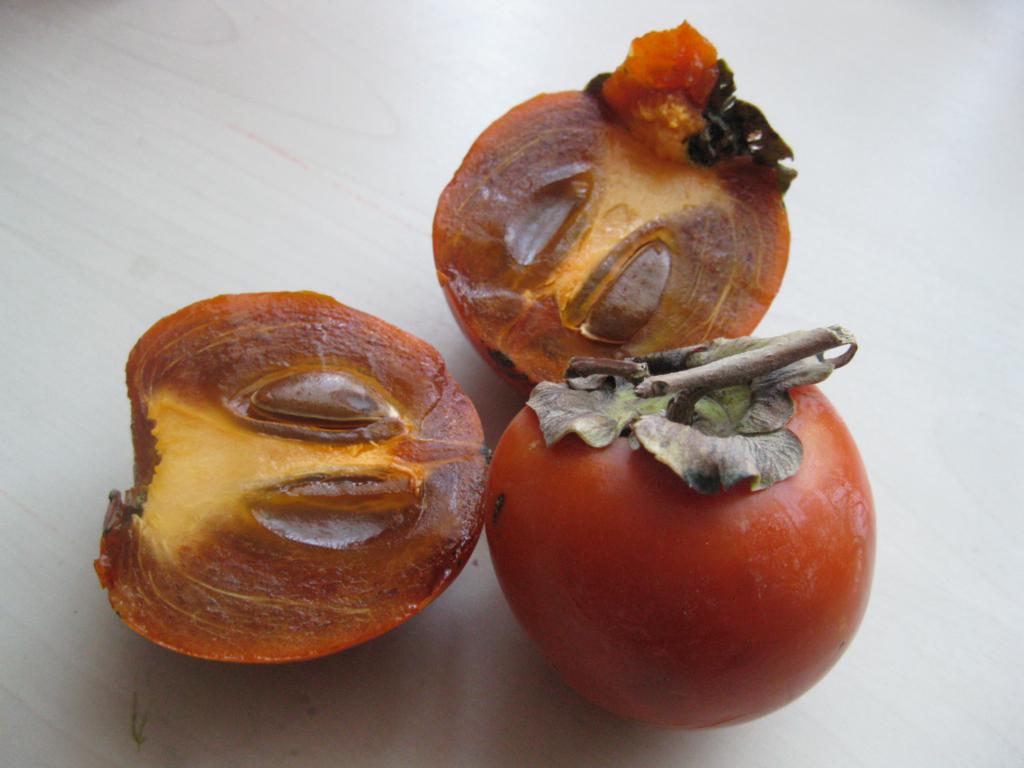
Fresh fruit is rich in potassium, magnesium, vitamin C, which prevent cardiovascular diseases, as well as dietary fiber and slow carbohydrates, indispensable in the fight against excess weight. It is best to eat fresh persimmons. But also make jam and all kinds of desserts from it. The roasted seeds are crushed and used to make a coffee substitute drink.
Bull heart
The variety of Tomato persimmons, which is also called the Bull's heart, is in great demand. Outwardly, the fruit is very similar to a tomato variety with the same name. The berry has a bright orange color that does not darken. There are no seeds in it, and the fruits reach a weight of up to 0.5 kg and a size of about 8 cm in diameter.
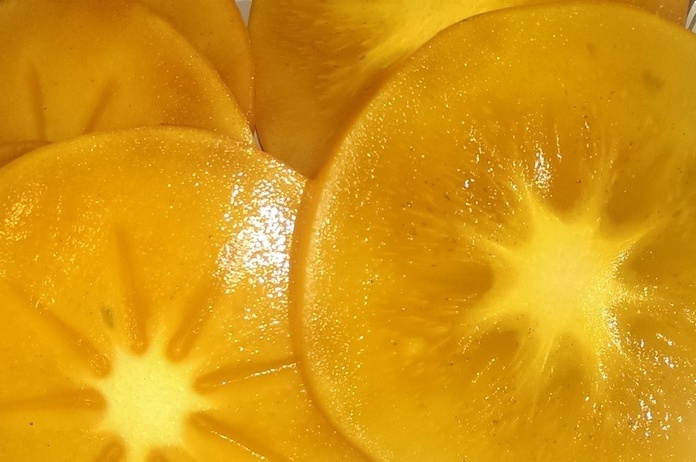
In appearance, such a persimmon resembles a heart, because its fruit is not round, but somewhat elongated. It contains a complex of vitamins and minerals necessary for the normal functioning of the body: vitamins C, A, group B, iron, magnesium, potassium, etc. A large amount of sugar refers this product to the list of contraindicated for diabetes. The berry grows exclusively in a subtropical climate. Persimmon pulp is used in salads, pastries and mousses.
 You may be interested in:
You may be interested in:Contraindications to the use of persimmons and harm to the human body
Despite the great benefits of the fetus, there are also contraindications to its addition to the menu. The berry can cause significant harm if consumed in such conditions or in childhood:
- Diabetes. Since persimmon contains a huge amount of sugar, it is not recommended for patients who suffer from diabetes mellitus. Of course, in the early stages of this pathology it is still permissible to eat several pieces of the fetus. But with insulin-dependent diabetes, persimmon is categorically contraindicated.
- Individual intolerance or tendency to allergic reactions.
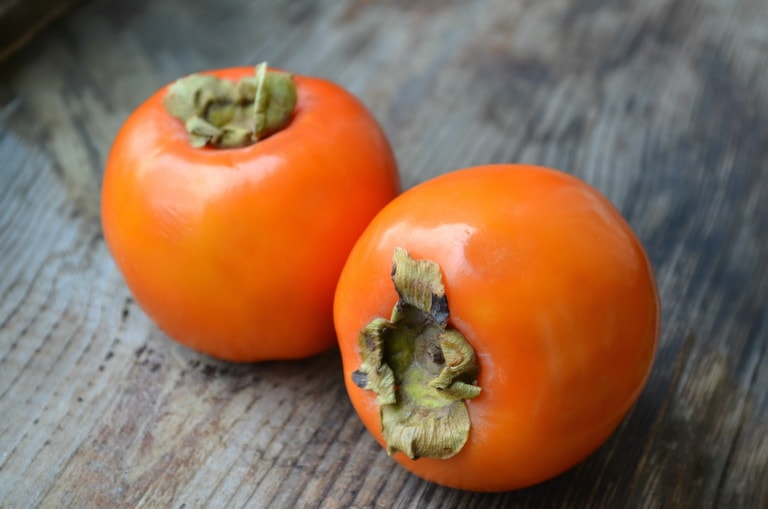
Persimmon is a fairly allergenic product, so its use can provoke manifestations of intolerance. - Obesity. Due to its high sugar content, the berry is not very useful for overweight people. But this only applies to its excessive use. One fruit per day even contributes to weight loss. Also, due to the astringent effect, a person's metabolism worsens, which also leads to problems with weight.
- Bowel problems, tendency to constipation.
- The postoperative period.
- It is also forbidden to give the berry to young children who have not reached the age of 3 years. The tannins contained in it can cause constipation, since they negatively affect the fragile gastrointestinal tract.
- Children under 10 years of age should also eat fruit with caution - not more than 1 piece per day.
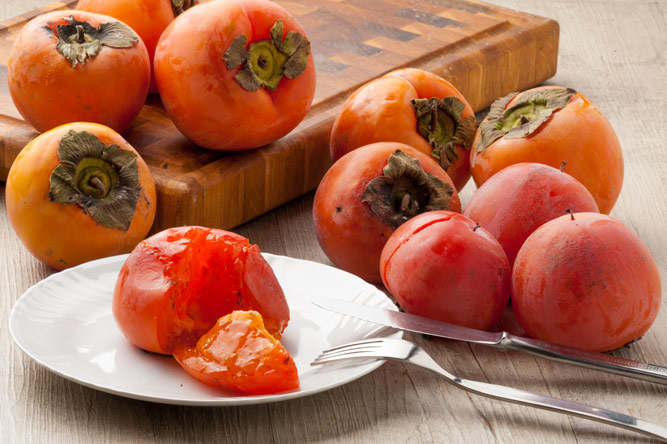
If you have problems with the intestines or allergic manifestations, it must be excluded from the diet of the child. - The systematic use of persimmons in large quantities can harm the body. For example, if a person eats about 2 kg of fruit per day, then he develops yellowness of the skin.And if you abuse a berry for several years, dense balls of poorly digested substances accumulate in the body, which worsens the work of the stomach and negatively affects the general well-being of a person.
The health benefits of persimmons for women
Persimmon is a useful and even necessary product for women's health. It contains such important trace elements as magnesium, potassium and iron, the lack of which negatively affects the female body.
During pregnancy
Persimmons should be included in the diet of pregnant women. It contains calcium, necessary for the formation of bone tissue of the fetus. Also, it is very important for a future mother to get enough magnesium and iron to avoid anemia and other unpleasant consequences. With anemia, it is very important to make up for iron deficiency, this element is indispensable in the process of blood formation.
Persimmon contains a sufficient amount of iron. Therefore, with anemia, you need to eat at least 2-3 fruits per day. There are also unpleasant moments. Since the fruits contain sugar and tannins, a pregnant woman may have problems - overweight and constipation. Therefore, it is important not to overeat during this period - you can eat 1 or 2 small fruits per day.
With GV
Persimmon is undoubtedly useful for women during lactation. Often, immediately after childbirth, immunity is weakened, and such a berry helps to saturate with vitamins and minerals not only the mother's body, but also the baby. Also, its use has a positive effect on the respiratory, digestive and cardiovascular systems.
If the child does not have a rash or other allergic manifestations, you can gradually increase the amount (but not more than 1 piece per day).
For women's health
The product is often called female happiness. This is due to the fact that its use:
- normalizes the menstrual cycle;
- reduces pain during menstruation;
- increases the chances of having a baby;
- improve the course of pregnancy and childbirth.
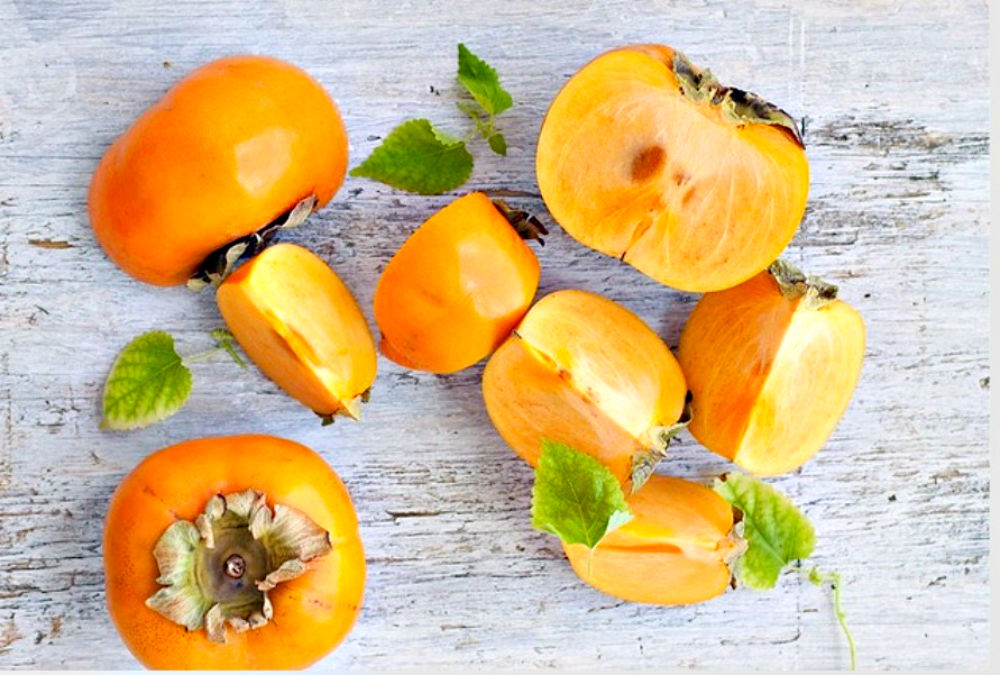
During menopause, women become especially vulnerable to various diseases. Often, due to a lack of potassium, they have problems in the work of the cardiovascular system, the risk of heart attack and stroke is significantly increased. Therefore, regular consumption of berries will help to fill its deficit. In addition, the diuretic effect of the fetus helps to eliminate the swelling that often accompanies women in this difficult period.
For weight loss
Persimmon is considered a dietary product. It has a very low calorie content - not more than 70 kcal per 100 g. Moreover, it contains proteins, fats and carbohydrates, as well as glucose. These nutrients give the body a feeling of fullness for a long time.
For body rejuvenation and skin
The antioxidants contained in the fruits help to reduce the harmful effects of free radicals, which are formed due to the influence of many environmental factors (poor ecology, poor nutrition, stress). As a result, damaged cells are restored, which contributes to the general rejuvenation of the body. To achieve the maximum effect, it is recommended to use persimmon for 2-3 pieces per week.
Beta-carotene is a necessary substance to maintain youthfulness and beauty of the skin.It protects it from the harmful effects of free radicals and ultraviolet rays, does not allow it to burn, prevents peeling and dryness. To improve the condition of the skin, at least 1 fetus should be eaten per day.
Also, the berry is used externally in the form of a mask or compress. The pulp has the ability to relieve inflammation and heal wounds, has an antibacterial effect. In this case, a little slurry from the pulp of the berry should be applied to the affected area of the skin.
In cosmetology
Persimmon is often used in cosmetology. At the same time, it is considered a universal remedy, since it is suitable for any type of skin. Most often, masks are prepared from it, which have the following properties:
- tone the skin;
- prevent the appearance of blackheads;
- narrow pores;
- moisturize;
- nourish.
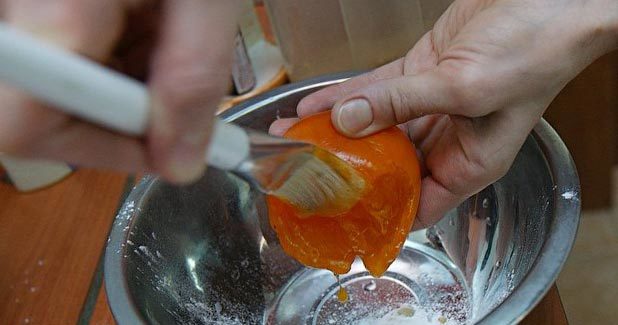
Features of the use of persimmons for men
Men have a stronger body than women. But they also have situations when their immune system fails. For example, during a period of physical exhaustion, after an infectious disease, with heavy power loads. It is at such moments that they need vitamin supplementation. And here persimmon helps a lot. Also, this product has an indispensable effect on the sexual sphere of men. Its main effects:
- promotes sperm production, improves its quality;
- increases the number of active seed cells;
- helps eliminate prostatitis;
- increases potency;
- reduces the risk of genital diseases.
In addition to a positive effect on reproductive function, the berry helps the work:
- Nervous system. The product stimulates the defenses, tones the body, helps to cope with stress and chronic fatigue.
- Hearts. The healing properties of the berry have a positive effect on the work of the heart muscle. Monosaccharides nourish the heart and blood vessels, protect them from damage, normalize blood pressure.
- Endocrine system. Magnesium and zinc stabilize the hormonal system, increase the production of male sex hormones, which positively affects male health in general.
 You may be interested in:
You may be interested in:Is it possible to eat persimmons with type 2 diabetes and how much?
Type 2 diabetes is an early stage of the disease. At the same time, the patient does not yet need insulin injections that maintain normal blood sugar levels. Such patients are allowed to consume sucrose and fructose in moderation. Therefore, with this pathology, the use of persimmons is allowed. Its benefits for diabetes:
- Increased immunity. In diabetics, the body is weakened, they are often prone to infectious diseases, their wounds heal more slowly.

The use of the product helps to resist infection, promotes tissue regeneration. - Improving metabolism.
- Vision improvement.
- Strengthening blood vessels. Due to the content of potassium and vitamins, the risk of developing angiopathy is reduced.
- The magnesium content helps to prevent kidney disease, prevents the formation of stones.
- Improves the activity of the cardiovascular system.
- Removes excess fluid.
- Beneficial effect on the activity of the nervous system, uplifting, relieves fatigue and nervousness.
But you need to follow some rules:
- Eat no more than 2 small fruits.
- Eat only ripe berries.
- Do not eat the berry at night and on an empty stomach in the morning.
- It is not recommended to drink water or milk.
Use for liver diseases
Persimmon has a therapeutic effect in various liver diseases:
- It removes toxins and toxins, helps detoxify the whole body.Since the liver is a natural filter, it often suffers from intoxication due to the uncontrolled use of harmful products, medicines, and alcoholic beverages. Persimmon has a diuretic and choleretic effect, potassium and magnesium contribute to the elimination of harmful substances.
- Increases the resistance of the body and liver to infectious diseases. The product also reduces the inflammatory process that forms in the liver and gall bladder against the background of an infection.
- Facilitates lipid metabolism.
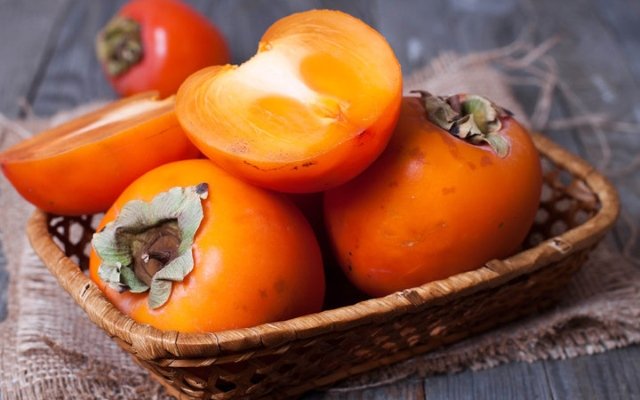
Coarse fibers help the liver break down fats, which prevents the body from becoming obese. - Restores the organ. The liver has the property of self-cleaning. But for this she needs vitamins and other substances. So, the fruit contains beta-carotene, which is recognized as an effective organ cleanser.
- For the normal functioning of the liver and the breakdown of glycogen, sucrose and fructose are needed, which are in sufficient quantities in persimmons.
It is useful to use the berry for hepatitis, fatty hepatosis and other pathologies of the liver and gall bladder.
 You may be interested in:
You may be interested in:Rules for the use of persimmons and how much you can eat
Of course, persimmon is a useful product. But in its composition there are substances that in excessive quantities can have a negative effect. For example, tannins lead to constipation, sugar - to obesity and metabolic problems. Therefore, it is important to know how much fruit to eat so as not to harm the body. Nutritionists recommend this scheme:
- adults without health problems can consume 4 pieces per day;
- diabetics (without insulin dependence) - no more than 2;
- pregnant women can have 1 or 2 fetuses;
- children from 3 years old - 1 fetus.
You need to choose the right berries. To do this, pay attention to their appearance. Ripe fruit has several features:
- saturated orange color;
- it is soft;
- there are no dark spots on it;
- its leaves are dry and brown.
It is best to eat fresh persimmons, but dried, dried or frozen fruits also have great benefits for the body.
- Fresh fruits and fresh are most useful, but they cannot be stored for long. After a few days, they lose their properties, begin to rot and become unsuitable for consumption. Ripe fruits are best stored in the refrigerator.

But immature berries hypothermia is harmful. It is better to leave them at room temperature until they are fully ripe. - Often, to preserve useful properties and increase the shelf life of the product, it is dried or dried. The berry prepared by drying has a higher calorie content - about 270 kcal. It also contains more potassium. Therefore, it is very useful for patients who suffer from high blood pressure. Good to know!Drying is the natural process of fermenting a product. Its advantage is the prevention of dehydration. At the same time, all useful substances are preserved.
- The freezing method also has several advantages. First of all, all the beneficial properties of the berry are preserved. With proper storage, it is suitable for use for 6 months. Also, during the freezing, the astringency of the fetus is eliminated, so it can be frozen unripe.
Persimmons can be combined with any fruits, vegetables, berries and other foods. It is often added to fruit salads, smoothies and smoothies. Also, the fruit improves the taste of different dishes, adding to them sweets and piquancy. The only recommendation is not to drink milk or cold water while eating the berry. This combination is likely to provoke stomach problems.
Common questions
Persimmon is a healthy and nutritious product. It ripens only in a subtropical climate. The fruits contain a huge amount of useful substances that help the body cope with many pathologies and prevent anemia, liver diseases, premature aging, cardiovascular diseases.

